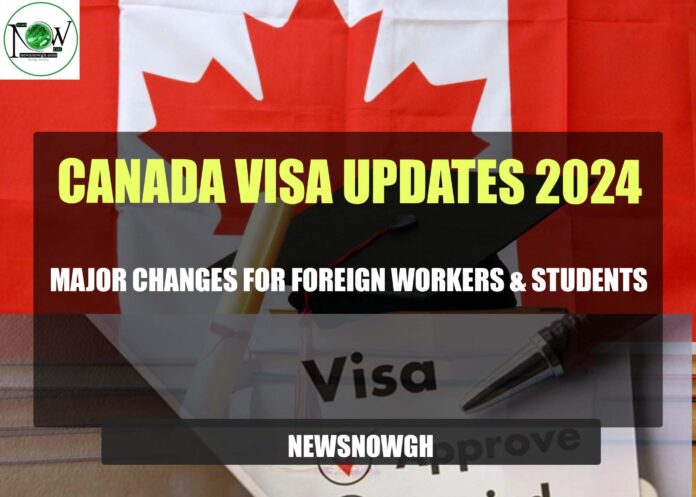Canada Visa Updates 2024: Major Changes for Foreign Workers & Students
There will be big changes to Canada’s immigration laws. A streamlined credential recognition system for foreign professionals is being introduced by British Columbia, and the Closed Work Permit program is about to be phased away. The impact of these revisions on international workers and students looking for opportunities in Canada will be significant.
In a move that will affect foreign students as well as foreign professionals, Canada has updated its protocols for recognizing credentials and work permits for 2024. These adjustments are being made as the nation works to improve its immigration laws and meet labor shortages.
1. Closure of the Closed Work Permit
The eventual elimination of the Closed Work Permit, a key component of Canada’s work visa program for many years, is a significant imminent change.
Knowing the Closed Work Permits Program
When the Closed Work Permit was first introduced in 1973, foreign professionals could work in Canada as long as they had a legitimate job offer and an authorized Labour Market Impact Assessment (LMIA). When local workers were not accessible, this initiative was created to assist Canadian firms in hiring talented individuals from outside.
Problems with the Closed Work Permit
The Closed Work Permit has been criticized over time by several sources:
- Restricted Worker Mobility: Because they can only work for one employer while holding this permit, foreign workers may be exploited and have limited career mobility.
- Employer Constraints: Because of this permit’s strict framework, businesses have found it difficult to relocate their staff between locations.
- Impact on the Canadian Labor Market: Some firms have been able to avoid hiring local laborers, according to critics of the scheme, which has raised questions about how this may affect employment domestically.
What Comes Next for the Closed Work Permit?
Over the following three years, the Canadian Senate suggested gradually eliminating the Closed Work Permit. For foreign workers to continue working in Canada, they will need to look into alternate visa alternatives, as the government must reply to this recommendation within 150 days.
2. British Columbia Simplifies the Process for Experts
A new streamlined approach to more efficiently recognize international credentials has been established by British Columbia in an attempt to facilitate the entry of foreign experts into the local workforce. This is a component of the province’s plan to address the growing need for skilled labor in several important industries.
A Novel Era in Credential Acknowledgment
The goal of the new system is to facilitate the faster integration of foreign professionals into British Columbia’s employment by streamlining the process of verifying foreign degrees and work experience.
Important Changes in the New Framework
- Decreased Experience Requirements: Foreign professionals will have an easier time qualifying for positions because they won’t have to deal with as many obstacles as their previous work experience.
- Relaxed Language Proficiency Standards: To enable those with recognized abilities to enter the workforce more quickly, the province is also thinking about decreasing the language proficiency standards for several occupations.
Occupational Targets in British Columbia
There is a strong need for competent individuals in 29 occupations, where this new method is applicable. Among the important vocations are:
- Early Childhood Educator
- Lawyer
- Social Worker
- Land Surveyor
- Chartered Accountant
- Biology Technologist
This expedited procedure will shorten the time it takes for foreign professionals to begin practicing their professions, so alleviating severe shortages in social services, education, and the legal system, among other areas.
The Implications for Canada’s Workforce of These Changes
The changes to Canada’s visa requirements for 2024 signal a dramatic change in the nation’s immigration and employment laws. Even while some foreign workers may find it difficult, the phase-out of the Closed Work Permit is part of a larger plan to give Canadians priority in the job market.
However, British Columbia’s new credential recognition scheme demonstrates how committed Canada is to hiring qualified foreign workers and filling labor gaps in vital areas.
Getting Ready for the Shift
To pursue their professions in Canada, the government encourages foreign professionals who now have or are applying for a Closed Work Permit to look into alternative immigration paths, such as open work permits. In the meanwhile, candidates interested in British Columbia might discover that the new credential recognition system opens doors to quicker employment in the province’s booming industries.
This change in policy signals a new course for professionals and students hoping to immigrate to Canada in 2024 and beyond, as it reflects Canada’s focus on striking a balance between its immigration laws and local worker needs.
Follow us on Newsnowgh.com to stay updated on the latest information regarding work permits, visa application processes, paths to permanent residency, and visa-sponsored employment.


